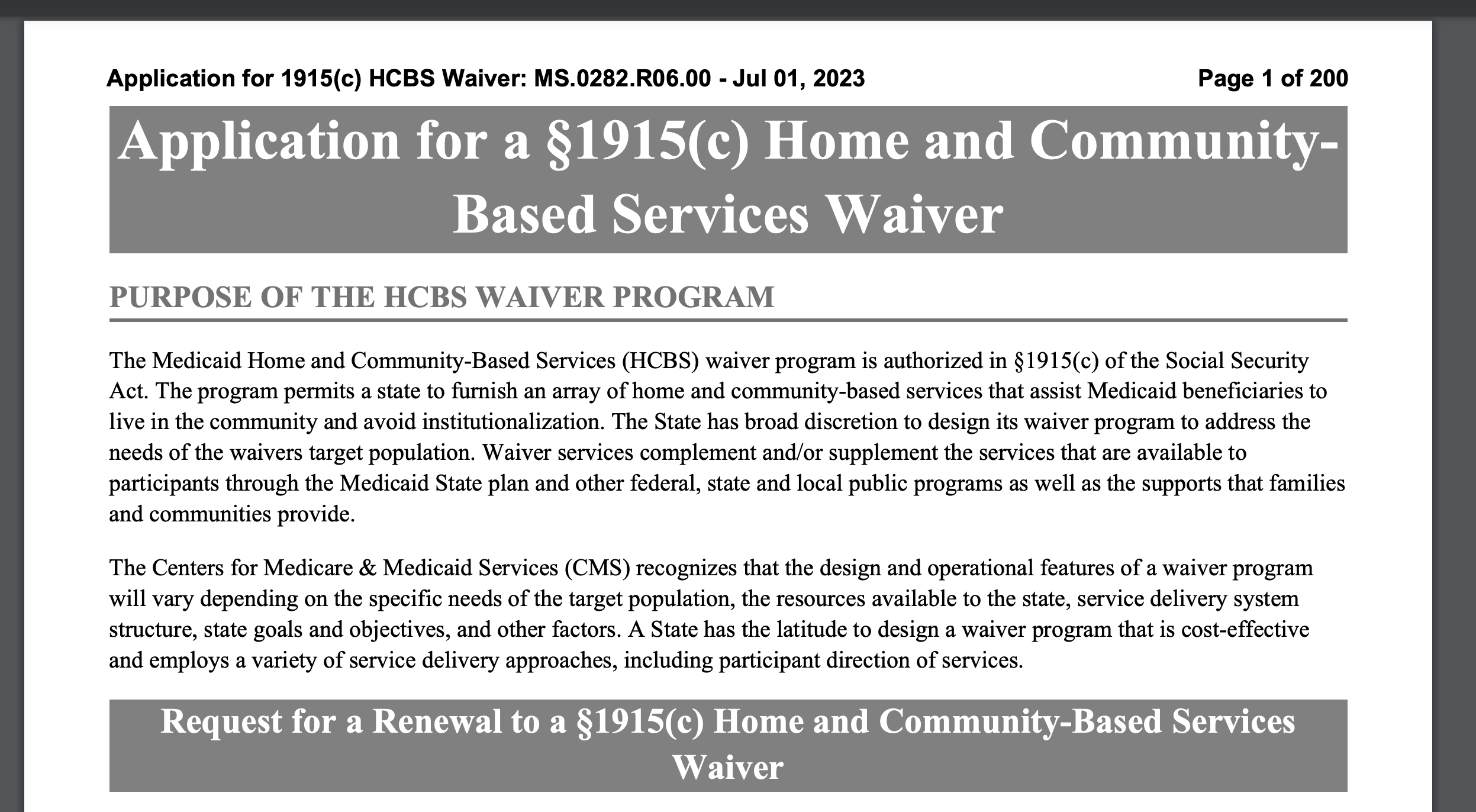The Mississippi Division of Medicaid (DOM) reported that it “submitted to the Centers for Medicare and Medicaid Services (CMS) the Intellectual Disabilities/Developmental Disabilities (IDDD) Waiver Renewal Application on March 31, 2023,” and that “you can see the pages here: MS IDDD Waiver Renewal Submitted to CMS 3.31.23.” We publicly thank the Division of Medicaid for its responsiveness to our outreach and questions during the renewal application process.
The IDDD waiver is paid for through the Division of Medicaid but implemented through the Mississippi Department of Mental Health (DMH). DMH regional centers employ the service coordinators. These DMH documents describe how the department will administer the IDDD waiver:
- 2022 IDD Support Coordination Manual
- 2022 IDD Targeted Case Management Manual
- 2022 IDD Targeted Case Management Manual Part II Supplement
- PSS, ASP and Service Note Training for IDD Providers September 2016
- IDD Plan of Services and Supports Example Trey
- IDD Activity Support Plan Example Alice
- IDD Service Note Example Mary
- 2020 DMH Operational Standards (covers all services, including IDDD)
Families as Allies submitted these public comments about the waiver application. Highlights from our comments include:
- We continue to urge the Division to partner with all relevant stakeholders, especially families of waiver participants, to explore feasible and accountable models to pay legally responsible persons to provide some services. We appreciate your DOM staff attending the Lucile Packard Foundation webinar on March 8 about how other states use this option.
- DOM’s response does not address participants and families sharing oversight and accountability monitoring and having access to audits and corrective action plans. We urge the DOM to include participants and families in these activities and make audit and corrective-actions plans public, with any personally identifying information redacted.
- We commend the DOM for conducting a rate study and urge the Division to include families in the study process. Families can give real-world feedback about challenges with finding providers and rates required to find providers to meet their loved one’s needs.
- We urge the Division to choose participant direction for this waiver.
- The various processes for waiver participants or their families to report complaints or abuse seem confusing, and it is unclear which agency should be contacted under which circumstances. The application assumes that the care coordinating agency (Mississippi Department of Mental Health) will often make the appropriate contacts. Instead, families need to be able to make these contacts themselves and know who to call in which circumstances. We also recommend ensuring that all waiver participants and their families are clearly informed about Disability Rights’ designation as the state’s federally designated protection and advocacy entity.
- Even though the state’s application supports freedom of choice, it was unclear during the public hearing if families feel that there are options for their loved ones and if they feel free to choose among them.
- The waitlist remains a significant issue, with some families reporting that they have already waited up to fourteen years.
On April 6, 2023, Mississippi Today published these articles by Anna Wolfe about families’ experiences with the waiver:
- ‘You’re not in line’: Family battles politics, indifference, and suspected fraud in federal health care program
- AG investigating provider fraud in Medicaid waiver
- Texts show lawmaker influence over Mississippi’s Medicaid rolls (This article includes the collection of texts Mississippi Today obtained. (In full disclosure, texts to, from or about Joy Hogge, executive director of Families as Allies, are on pages 18, 19, 63, 64, 66, 90, 91 and 94)
We appreciate families coming forward with their concerns through the public comment process and sharing their experiences with Ms. Wolfe. Every allegation of fraud and mismanagement should be thoroughly and objectively investigated. The Division of Medicaid encourages anybody who suspects Medicaid fraud to notify the agency here.
Regardless of where the investigation into families’ concerns and allegations of fraud leads, waiver services cannot be responsive unless families and service recipients are partners in decisions regarding their own care and the policies and practices that govern the waiver overall.

